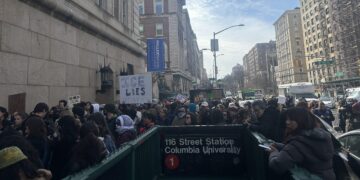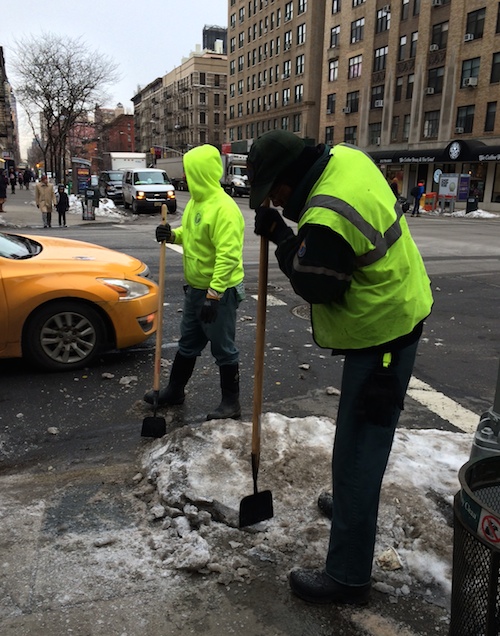We have written before about people who find creative ways to squeeze into tiny apartments on the Upper West Side. As space becomes ever-tighter for non-millionaires in this city, more developers are finding ways to squeeze a full apartment into less than 400 square feet, even using extra-small appliances. The Times reports that a new micro-apartment development has opened at 335 East 27th street.
On the Upper West Side, the Greystone Hotel on 91st and Broadway has remodeled many apartments to create efficiency units.
“Kelli Okuji, 27, a graduate student at Columbia University, lives in one, a newly renovated apartment of 313 square feet at the Greystone, a former hotel built in 1923 on the Upper West Side that has since turned its rooms into luxury rentals. Ms. Okuji occupies one of 26 efficiency units under 400 square feet, each of which comes with high-end finishes and appliances, a Murphy bed that tucks into the wall and access to a broad variety of building amenities, including a gym and a landscaped rooftop lounge.”
Her unit has a mini-dishwasher and an oven that doubles as a microwave. Rent is $2,600 a month.
When you learn about the woman who squeezed into 90-square-feet on West 70th street, 300 feet will sound like a luxury!










While I won’t judge another persons choice, and I am glad that this young woman is happy in her apartment…I just have to say I think this whole thing is sick. The micro apartments quoted in the Times article will rent between $2,000-3,000 a month, for something the size of a large walk in closet. To me this isn’t an example of responding appropriately to a need for secure, stable, affordable housing, so much as it is an opportunity for people to take advantage of the desperation of others.
We all know, there are plenty of larger studios available at those price ranges, and one can always share, or move to outer boroughs…I know someone on 97th & Columbus in 900 sq feet of space for $3,300….why would you pay $3,000 a month for one of these micro-jokes?
I am sad that there are people who are desperate to be here, feel they have no other choice, and will be paying $3,000 a month for something they can’t even move around in.
This is an absolute joke. NYC has become a really sick place to live. I’m disgusted with how quickly capitalism has jettisoned the dreams of the average person right out of the chance of living here.
By the way, that micro housing is on EAST 27th, not West 27th Street….
I agree with you Time To Move, on all points. I’m amazed that anyone would pay $2,600 a month to live in a micro apt in the Greystone!! I have a friend who sold a 2 BR and rented a smallish studio (425 sq ft) in a lux bldg on Lex above 96th, but the building has a gym & membership PH club level with pool table, huge, TV, dining room etc. At least for her $$ she gets a full real kitchen, her own washer/dryer, huge walk in closet, nice size bathroom and a communal landscaped roof deck.
but Japanese are very used to living in tiny spaces. It could be in her DNA. I would never pay that much to live in so small a space. Manhattan is not worth it.
These micro-apartment buildings also have poor doors which are so incredibly small that only midgets and small animals can manage to squeeze through them. But you can’t beat the price!
Fixed, thanks. WSR
The kind of people who are willing to pay prices like that are same kind of people who would be the first to tell you that they pay 3000 bucks for a hip microapartment. no love lost.
Greedy landlords! Yeah, I was the first to say it!
Sounds like a 21st Century SRO to me.
Is there something wrong with SROs?
The song doesnt go, “If you can make it here you can make it most average places”. This is one of the best, most eclectic, interesting, fun, and competitive cities in the world. It’s not cheap and its not for the “average” person. Not to worry however, there are plenty of apartments in Tulsa, Peoria, and Louisville if you’d like to live an average life.
Having started out in my marriage in a 290-sq-ft apartment (10 W 76th) and having a first son join us, we were happy as clams for a while. Long live the free market re: real estate.
But as someone who grew up in a rent controlled apartment (50 East 96th), I’m a big fan also of affordable housing. Both types make Manhattan that place that we all love. The key is a mix of housing stock, yes?
We need to constantly balance this.
all well and good but we are way out of balance right now. there is an affordability crisis, and it’s not going to be solved by free market measures alone, or even primarily. in fact, in part it was the weakening of rent regulations that got us here.
I would argue that the free market in housing, at least in NY, is basically a myth. there is govt intervention (and has been for 70 years) in any number of ways: beyond rent regulation, all sorts of tax credits, zoning rules, the mortgage interest deduction, and so on.
Only in housing and only in New York? Do “free markets” actually exist anywhere in reality?
Isn’t the basic corporate/banking formula: privatize profit, socialize risk? Or, put another way, ‘Socialism for me, capitalism for you.’
You mentioned the Austrian, “libertarian” school of economics. Don’t you have to at least give them credit for consistency? They actually oppose corporate subsidies, bailouts and the like.
Bruce…what is happening? This is the most sane thing I have seen you write! I thought you were content in your WEA apartment next to the new SROs!!
Time to Move: Perhaps you might be getting me mixed up with someone else? I live on Riverside. there are no new SROs on my block but there is the homeless shelter. I have been posting on the issue of affordable housing for a long time and have been arguing in favor of continued rent regulation and against the various displacements, such as the Williams seniors.
there is a myth that i support more homeless shelters on the UWS. I don’t. I simply object to the knee-jerk response to our 95th street homeless shelter and the endless harping on the supposed crime it produces. it is mostly middle aged and elderly people, many disabled, probably some current or former substance abusers. I don’t see where it has made any difference on the block in re crime. That’s all. Just arguing for facts and against hysteria and hyperbole. The people in that shelter are my neighbors and have hard lives.
I basically agree with most of Howard’s postings, which are thoughtful and help make for better dialog on this site.
I’d say that sounds overpriced, but if that’s what the market will bear then good for them. Some people don’t want roommates. Some people don’t want or need a lot of space and like to live simply.
I am renting my 45sq ft apartment with a great view of my kitchen and living room. $300. Atleast you can tell you’re friends you live on the UWS. Also, occassionally stop by for a 15-20 power nap. Computer chair provided.
I think Manhattan has a fetish to make things smaller than what it needs to be. This isn’t Tokyo. There still is a lot of space and sizable apartments as you look further uptown.
This is the logical result of artificial restrictions of housing supply due to bad public policy. We do NOT have a free market, contrary to what some other posters have stated. Only 39.1% of the rental market is unregulated in NYC. We should:
– get rid of rent control
– get rid of rent stabilization
– get rid of NYCHA projects
– get rid of landmarking
– aggressively rezone manufacturing areas to residential
– ease restrictions on new building
In a word: deregulate. That is the only way the NYC rental market will return to normalcy.
the result of your scheme would be the displacement of millions of poor and working class people. i think there are 600,000 in public housing alone.
And it probably would raise average housing costs, not lower them.
hell, why not get rid of all zoning regulations, if you’re gonna go that route?
i notice you don’t advocate getting rid of subsidies for the upper classes and developers. How about getting rid of all the property tax credits? and the mortgage interest deduction?
– These programs should be phased out in a humane fashion over years. Elderly and disabled individuals who are unable to support themselves could be grandfathered in. Able-bodied individuals would be forced to support themselves just like everyone else does.
– Zoning regulations should be examined from a cost/benefit perspective and revised. It’s safe to say that no manufacturing jobs will ever return to NYC (unfortunately). Given the emergency housing shortage, why would the city be restricting new buildings to 6 stories in some areas.
– I would get rid of all tax credits such as 421a and mortgage tax deduction and lower rates across the board for everyone. Basically a flat tax with a very high standard deduction such as 80k or so.
– I would also ban wealthy foreign money launderers from parking their money in NYC real estate.
Is it not true that for many years already, working one or even several full-time jobs has rarely been enough for one to afford market Manhattan real estate rates?
I realize that rent regulations and public housing both have their share of problems and can be abused. Is it not the case, however, that without rent regulations and public housing, only the wealthy would be able to live in Manhattan? Is this what you would like?
What about foreign investors who simply purchase real estate here that they neither live-in nor rent-out?
(I’m not sure just what you meant by “money launderers”.)
What about foreigners (i.e., non-U.S. Citizens) who purchase property here that they may use as little as a few days out of the year or less?
Should such privileged elites be allowed to compete with those who live and work and have family in New York City over what is such an extremely limited amount of space?
Can such situation be considered a natural market?
Do you support any restrictions on development? Do you place any value on leaving some open space?
Is there no point at which you would concede that the island of Manhattan has been overdeveloped and overpopulated? A point at which excessive congestion, crowds and noise will result in property values going into decline?
The whole micro-apartment needs to stop being reported with glossy excitement from news agencies, it’s driving prices up and making them seem like an exciting novelty rather than the pointy end of capitalism that they are
While I do agree that this city is becoming more and more a place for the very-reach, you all should not forget that MOST rentals in the city are either rent-stabilized or rent-controlled. I believe around 60 percent. So, while there are no more affordable housing to buy, there is plenty if adjustment to be done in the rental markets. There are a lot of people that have these rent controlled apartments and use it as their own property. I think there should be income check at least every 5 years to make sure not the lucky ones but really deserving people get to have them. I know lawyers, doctors, etc that have these apartment and no one on this list ever talks about that.
Sounds like you meant more and more out-of-reach for all but the very rich.
i believe there is an income check every two years, upon lease renewal. If you are in an apt that is above the rent threshold, you have to submit proof of income.
However, I don’t believe there should be a rent threshold for destabilization, as this removes a lot of affordable units from the system. Once they leave rent stabilization, they never regain affordability.
This is the market, to blame “greedy landlords” is just plain ignorant to market economics.
Look at it this way: many apartments in the area are going for ~$1200 per sqft for sale so paying rent at a rate of ~$120 per sqft (per anum) – 3000 a month for 300 sqft, means you would reach equilibrium at about 10 years, which is prob around the point that a 30 mortgage begins to move from interest to principle pay down…these are very rough numbers and assumptions but you can see from some simple back of envelope these rents are actually not totally out side of what the market should demand…
To all you folks that own (or rent) apartments and think the market is itself is crazy, I say you should sell and move. Remember every day you don’t sell you are effectively buying, so you are basically buying real estate at current “crazy” prices, or continuing to rent at them…
Thanks AUWS.
let us remember when you buy a co-op or condo after the initial sale those “greedy Landlords’ are your UWS neighbors. No one calls them out for asking so much. I wonder if one certain condo owner when the time comes will sacrifice personal gain and sell for less then market for the greater good of an “affordable” New York…….
so those of us who believe in affordable housing have to make special sacrifices, or otherwise we are hypocrites? that is a very shallow arguing ploy: “you believe in public housing, why don’t you move in there?” “you believe in supportive housing, why don’t you move in?”
I think most reasonable people can see the problem with that argument.
my building was taken out of the realm of affordability when it went condo. Rent stabilized tenants still make up about 35% of the building, and they are the most stable residents… they are not constantly moving. However, there will never be another affordable apt in that building.
you guys have an interesting concept of “aristocracy”. when my building was entirely rent-stabilized, it consisted of middle class and lower middle class people. many were artists, actors, a comedian, we actually have a working clown, singers, music teachers, a fair number of shrinks, people who work for non for profits.. decent hard working people. West Siders.
yes, maybe one or two were rich. very very few in a large building. ”
And a fair # of seniors..
these types of people, for the most part, are now lost to the next generation on the UWS. and sorry, they’re not “aristocracy” in any way shape or form.
but i’m very happy the existing “aristocracy” can stay as long as they wish.
Marie, one other point. Inheritance or succession of rent-stabilized apartments is far too small a phenomena to have any effect on the labor market, as you argue that it has. And often we are talking about elderly people or people who are outside of the workforce. Further, the inheritor would already have to be living in the apartment. And rents in stabilized apartments increase, in general, more than the rate of inflation.
Marie, having been a rent stabilized tenant in four apartments in NYC, including my current one (before buying), i think i do understand rent stabilized leases. i have also been involved in two tenants associations.
the restrictions on inheritance of apartments are a lot stricter than you describe. the person “inheriting” the apartment must prove that it was their primary residence — shared with the family member or partner whose name was on the lease — for two years immediately prior to the death or moving of the primary resident.
landlords frequently challenge the lease succession on this basis in court, and it can be quite expensive for a tenant to win a claim.
Nathan said:
‘A lease that one party is forced to renew certainly makes the other side “landed.”’
Not really. It means the side you are bemoaning — the tenants — had certain government mandated protections, which were needed. The landed side is the ownership side, which is the landlords.
You seem to be a libertarian and/or a follower of AUstrian economics. Am i right?
A lease that one party is forced to renew certainly makes the other side “landed.” Landlords at least paid the market rate for their buildings, and if the value has gone up that’s their reward for taking a huge capital risk. It’s not evil or greedy. Apartments are a scarce resource, made more scarce by rent control laws, and as such you should expect the market to react. Price discovery is a primary function of a market and increasing rents are a signal to those unwilling to pay it that they should seek cheaper housing where they are willing to pay for it.
Congratulations on your apartment. I’m sure if you ever decide to move you’ll rent it out to a needy family for less than your mortgage payment lest you also become a greedy landlord. (Sarcasm aside, maybe you *would* do this as you don’t seem to actually know what cash flow is or understand even basic econ.)
Bruce, I think the issue is that you don’t actually understand rent stabilized leases 🙂 They can be handed down to progeny. The only thing the progeny needs to do to inherit a vastly under-market rate apartment (a bonus of roughly 1-4k/month) is be born. The implications are far-reaching. That child inherits an 800/month apartment which allows them to take a low-paying job because they don’t need to make more money to pay the rent which then allows employers to offer lower salaries since there are candidates willing/able to work for less. They have become a different kind of “trust fund baby.” No man is an island and similarly the rent stabilization effects ripple far and wide and generally disservice everyone but the people who “landed” in the apartments (sometimes even then).
at a gut level, you guys seem to be envious of your rent stabilized neighbors. they’ve got a better deal (at least than Nathan). that doesn’t mean you are “paying for them.”
you want them to LOSE their deal?
I bought at a better price than most of my owner neighbors. does that mean they were subsidizing me?
If one is to make a comparison to the European aristocratic class — which after all were LANDED aristocrats — then obviously one has to look at the landlord class. The economic term is “rentiers.”
Nathan, how can you possibly say that the “landed” class in NYC are tenants who don’t own their apartments and not landlords who do?
when my entire building was rent-stabilized, the building still turned a profit. so now that it is 35% rent stabilized, explain to me how you think this subsidy works, and where it goes? (clue: the majority of the huge new cash flow went to the developer who turned it condo.)
Are you aware that aristocracy is not by definition a function of one’s income but of one’s birth and position. It’s a system of luck, not merit which is how there can be “an impoverished aristocracy” who are forced to sell off their possessions to survive.
I’m saying these NY aristocrats are ensconced in their subsidized apartments as a prime example of how life is not fair (p.s. when a price is regulated/held artificially low who exactly do you think makes up the difference? the UWS fairy?).
Who cares how much your neighbors made decades ago? They didn’t make the choice to buy and put their money behind their neighborhood. They are supported by the rest of who were “unlucky” in birth just as much as the people in NYCHA housing are.
I’m also in favor of scrapping the mortgage interest deduction. Ideologically because I belive th government ought not meddle in markets, and selfishly because I’m a renter and don’t benefit from it. It’s politically impossible though.
The word “aristocracy” applies very well. These are people who benefit greatly at the expense of the rest simply because of who they are. They did nothing to earn it. They are the landed class of New York.
They’re the most stable because they no longer have to make the same economic decisions the rest of us do. how is that fair to the rest of us? They get special protection while the rest of us subsidize the rent-control aristocracy?
Even worse though, some of them may not even be able to move even if they wanted to! Have a kid and need more space? Nope! The deal’s too good to ever give it up.
Housing subsides should be tied to the person not the unit. Nobody has a right to live anywhere unless they own. Section 8 benefits at least allow the beneficiary to make an economic decision in his own best interest. Rent control laws reduce choice for both the unit’s owner and the tenant, as well as increase prices for the rest of us.
The law of supply and demand exists and it applies to New York housing just like everything else.
Nathan, rent stabilization is not a subsidy — it’s a regulated price. and that is not such an unusual thing. For example, your electricity price is regulated. as is your Internet price… and it will continue to be, unless you want “net neutrality” — a form of pricing regulation — overturned.
If you want to talk about subsidies, let’s talk about the largest (by far) housing subsidy in the US — the mortgage interest deduction.
So about 1/3rd of your building is comprised of the aristocracy…those lucky people who, through no effort of their own but simple luck of birth (born long enough ago or into a family with a stabilized lease) now live off the back of their apartment’s owner. Ah, democracy – it dies a slow, sad death in NY real estate. And of course they’re not going anywhere – aristocracy never does without a revolution or a fight lol.
Well said Marie and Nathan.
Glad to see the majority is finally speaking up to the truth.
hard to argue those with basically unrealistic ideas– LOL rent controls are NOT a subsidy. Of course it is.
When the times comes to sell, will left wing condo owners self for substantially less then the market value in order to allow those with less to live as they do? would LOVE an answer.
Another bad attempt at deflection – justifying subsidized housing by with the IRS federal mortgage tax deduction – without mentioning NY recaptures the benefit with transfer taxes, mortgage recording taxes and of course, property taxes.
Well said Marie! Glad to see the majority is finally speaking up to the truth.
hard to argue those with basically communist ideals – LOL rent controls are NOT a subsidy.
When the times comes to sell, will left wing condo owners self for substantially less then the market value in order to allow those with less to live as they do? would LOVE an answer.
wow Marie, you really got him going.
And now he is an economist too!
Interesting that he talks about “facts” when the replies are the farthest thing from it.
One more point:
Never got an answer if going to rent/sell for substantially less then market rate, for the greater good, of course………
Who needs space in the most exciting city in the world. A bed, a bath, a closet, you are good to go!
Space is for people that don’t go out, don’t take advantage of the culture, night life, food, etc.
Why live in the most expensive city in the country if sitting in an apartment is how one spends time?
My husband and I live in a 290sq ft studio. Not because it’s cool, but because it is what we could afford. A temporary situation has turned into 2 years in a flash. We make it work, but I’m desperate for more space and some actual sunlight. I go visit our furniture in storage and weep quietly at the memories of dinner parties at my dining table covered in boxes and shoes. Hubby reminds me all the time how we are steps from…insert landmark. All I know is that we have no secrets from one another and we can live anywhere now. I will say, you can’t beat the UWS…I wouldn’t want to be anywhere else in Manhattan. I’d just really like a washing machine. A girl can dream…